Crisis Management Practices in Hospitality Industry during COVID-19
VerifiedAdded on 2023/06/10
|6
|2727
|400
AI Summary
This research proposal focuses on crisis management practices used by the hospitality industry to deal with the impact of pandemic COVID-19. The study aims to determine the significance of such practices in managing business functions in an appropriate manner. The report includes literature review, methodology, and work planning. The chosen research methods are positivism philosophy, deductive approach, survey, primary and secondary data collection, frequency distribution, and probability sampling.
Contribute Materials
Your contribution can guide someone’s learning journey. Share your
documents today.
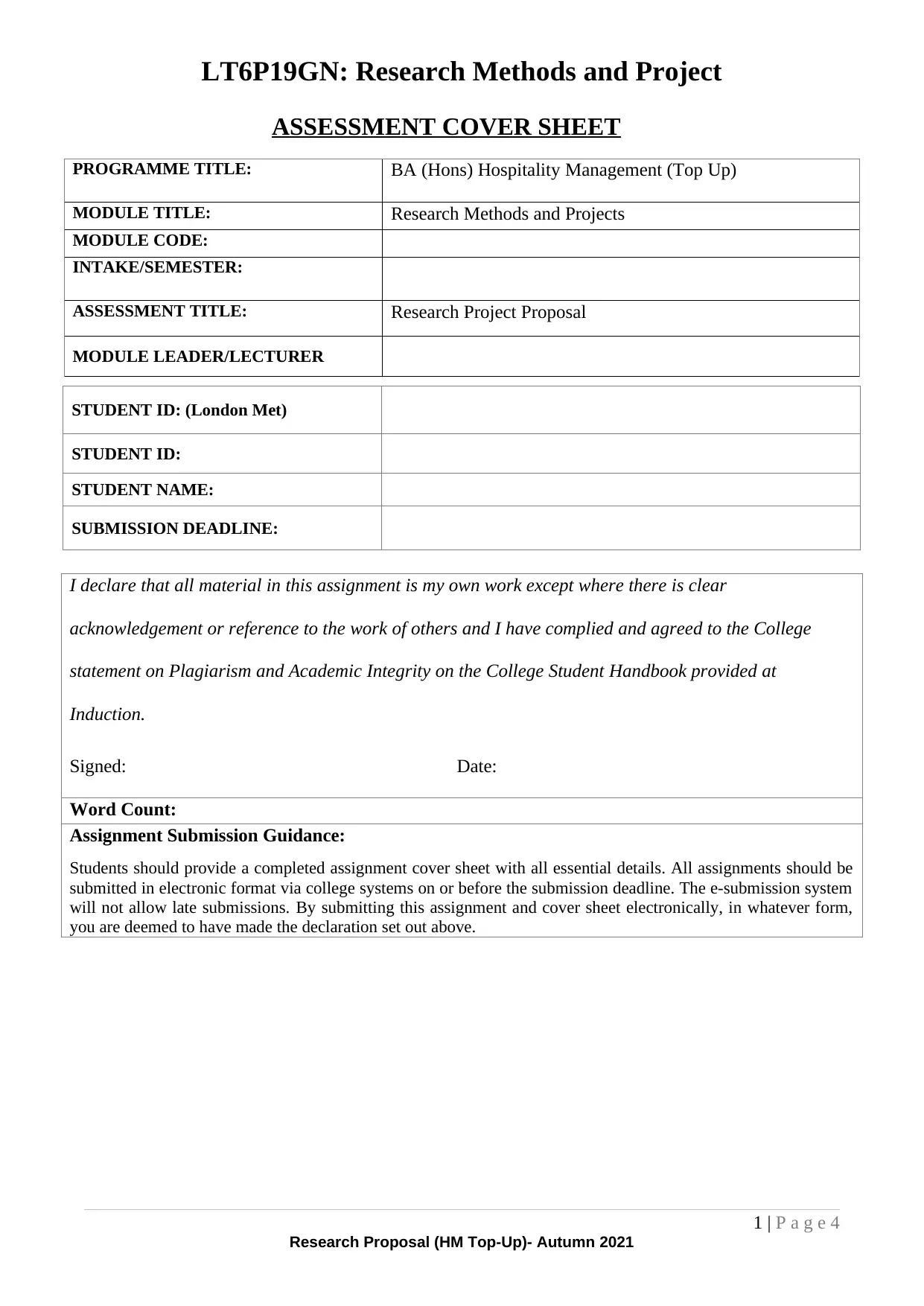
LT6P19GN: Research Methods and Project
ASSESSMENT COVER SHEET
PROGRAMME TITLE: BA (Hons) Hospitality Management (Top Up)
MODULE TITLE: Research Methods and Projects
MODULE CODE:
INTAKE/SEMESTER:
ASSESSMENT TITLE: Research Project Proposal
MODULE LEADER/LECTURER
STUDENT ID: (London Met)
STUDENT ID:
STUDENT NAME:
SUBMISSION DEADLINE: 019
I declare that all material in this assignment is my own work except where there is clear
acknowledgement or reference to the work of others and I have complied and agreed to the College
statement on Plagiarism and Academic Integrity on the College Student Handbook provided at
Induction.
Signed: Date:
Word Count:
Assignment Submission Guidance:
Students should provide a completed assignment cover sheet with all essential details. All assignments should be
submitted in electronic format via college systems on or before the submission deadline. The e-submission system
will not allow late submissions. By submitting this assignment and cover sheet electronically, in whatever form,
you are deemed to have made the declaration set out above.
1 | P a g e 4
Research Proposal (HM Top-Up)- Autumn 2021
ASSESSMENT COVER SHEET
PROGRAMME TITLE: BA (Hons) Hospitality Management (Top Up)
MODULE TITLE: Research Methods and Projects
MODULE CODE:
INTAKE/SEMESTER:
ASSESSMENT TITLE: Research Project Proposal
MODULE LEADER/LECTURER
STUDENT ID: (London Met)
STUDENT ID:
STUDENT NAME:
SUBMISSION DEADLINE: 019
I declare that all material in this assignment is my own work except where there is clear
acknowledgement or reference to the work of others and I have complied and agreed to the College
statement on Plagiarism and Academic Integrity on the College Student Handbook provided at
Induction.
Signed: Date:
Word Count:
Assignment Submission Guidance:
Students should provide a completed assignment cover sheet with all essential details. All assignments should be
submitted in electronic format via college systems on or before the submission deadline. The e-submission system
will not allow late submissions. By submitting this assignment and cover sheet electronically, in whatever form,
you are deemed to have made the declaration set out above.
1 | P a g e 4
Research Proposal (HM Top-Up)- Autumn 2021
Secure Best Marks with AI Grader
Need help grading? Try our AI Grader for instant feedback on your assignments.
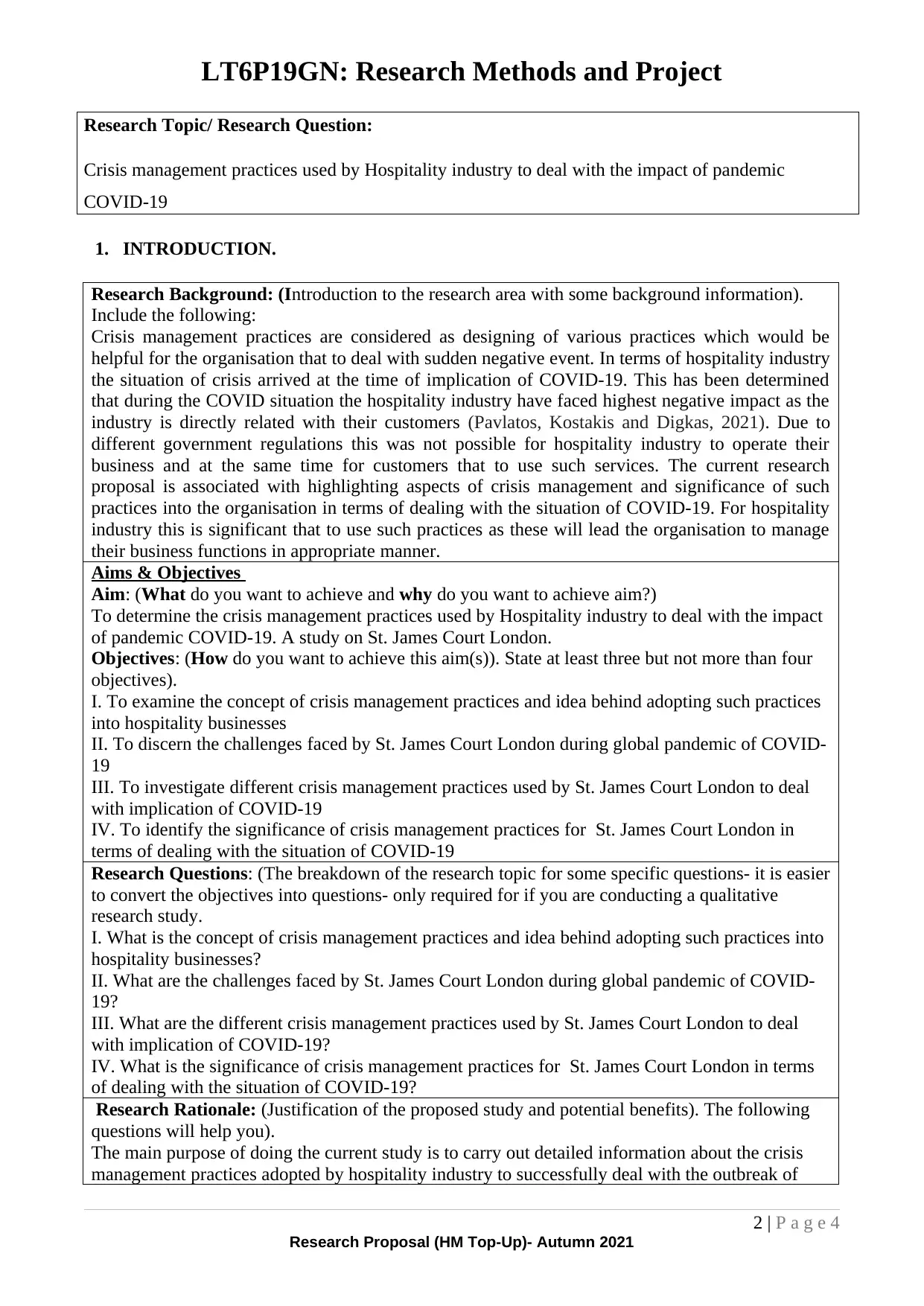
LT6P19GN: Research Methods and Project
Research Topic/ Research Question:
Crisis management practices used by Hospitality industry to deal with the impact of pandemic
COVID-19
1. INTRODUCTION.
Research Background: (Introduction to the research area with some background information).
Include the following:
Crisis management practices are considered as designing of various practices which would be
helpful for the organisation that to deal with sudden negative event. In terms of hospitality industry
the situation of crisis arrived at the time of implication of COVID-19. This has been determined
that during the COVID situation the hospitality industry have faced highest negative impact as the
industry is directly related with their customers (Pavlatos, Kostakis and Digkas, 2021). Due to
different government regulations this was not possible for hospitality industry to operate their
business and at the same time for customers that to use such services. The current research
proposal is associated with highlighting aspects of crisis management and significance of such
practices into the organisation in terms of dealing with the situation of COVID-19. For hospitality
industry this is significant that to use such practices as these will lead the organisation to manage
their business functions in appropriate manner.
Aims & Objectives
Aim: (What do you want to achieve and why do you want to achieve aim?)
To determine the crisis management practices used by Hospitality industry to deal with the impact
of pandemic COVID-19. A study on St. James Court London.
Objectives: (How do you want to achieve this aim(s)). State at least three but not more than four
objectives).
I. To examine the concept of crisis management practices and idea behind adopting such practices
into hospitality businesses
II. To discern the challenges faced by St. James Court London during global pandemic of COVID-
19
III. To investigate different crisis management practices used by St. James Court London to deal
with implication of COVID-19
IV. To identify the significance of crisis management practices for St. James Court London in
terms of dealing with the situation of COVID-19
Research Questions: (The breakdown of the research topic for some specific questions- it is easier
to convert the objectives into questions- only required for if you are conducting a qualitative
research study.
I. What is the concept of crisis management practices and idea behind adopting such practices into
hospitality businesses?
II. What are the challenges faced by St. James Court London during global pandemic of COVID-
19?
III. What are the different crisis management practices used by St. James Court London to deal
with implication of COVID-19?
IV. What is the significance of crisis management practices for St. James Court London in terms
of dealing with the situation of COVID-19?
Research Rationale: (Justification of the proposed study and potential benefits). The following
questions will help you).
The main purpose of doing the current study is to carry out detailed information about the crisis
management practices adopted by hospitality industry to successfully deal with the outbreak of
2 | P a g e 4
Research Proposal (HM Top-Up)- Autumn 2021
Research Topic/ Research Question:
Crisis management practices used by Hospitality industry to deal with the impact of pandemic
COVID-19
1. INTRODUCTION.
Research Background: (Introduction to the research area with some background information).
Include the following:
Crisis management practices are considered as designing of various practices which would be
helpful for the organisation that to deal with sudden negative event. In terms of hospitality industry
the situation of crisis arrived at the time of implication of COVID-19. This has been determined
that during the COVID situation the hospitality industry have faced highest negative impact as the
industry is directly related with their customers (Pavlatos, Kostakis and Digkas, 2021). Due to
different government regulations this was not possible for hospitality industry to operate their
business and at the same time for customers that to use such services. The current research
proposal is associated with highlighting aspects of crisis management and significance of such
practices into the organisation in terms of dealing with the situation of COVID-19. For hospitality
industry this is significant that to use such practices as these will lead the organisation to manage
their business functions in appropriate manner.
Aims & Objectives
Aim: (What do you want to achieve and why do you want to achieve aim?)
To determine the crisis management practices used by Hospitality industry to deal with the impact
of pandemic COVID-19. A study on St. James Court London.
Objectives: (How do you want to achieve this aim(s)). State at least three but not more than four
objectives).
I. To examine the concept of crisis management practices and idea behind adopting such practices
into hospitality businesses
II. To discern the challenges faced by St. James Court London during global pandemic of COVID-
19
III. To investigate different crisis management practices used by St. James Court London to deal
with implication of COVID-19
IV. To identify the significance of crisis management practices for St. James Court London in
terms of dealing with the situation of COVID-19
Research Questions: (The breakdown of the research topic for some specific questions- it is easier
to convert the objectives into questions- only required for if you are conducting a qualitative
research study.
I. What is the concept of crisis management practices and idea behind adopting such practices into
hospitality businesses?
II. What are the challenges faced by St. James Court London during global pandemic of COVID-
19?
III. What are the different crisis management practices used by St. James Court London to deal
with implication of COVID-19?
IV. What is the significance of crisis management practices for St. James Court London in terms
of dealing with the situation of COVID-19?
Research Rationale: (Justification of the proposed study and potential benefits). The following
questions will help you).
The main purpose of doing the current study is to carry out detailed information about the crisis
management practices adopted by hospitality industry to successfully deal with the outbreak of
2 | P a g e 4
Research Proposal (HM Top-Up)- Autumn 2021
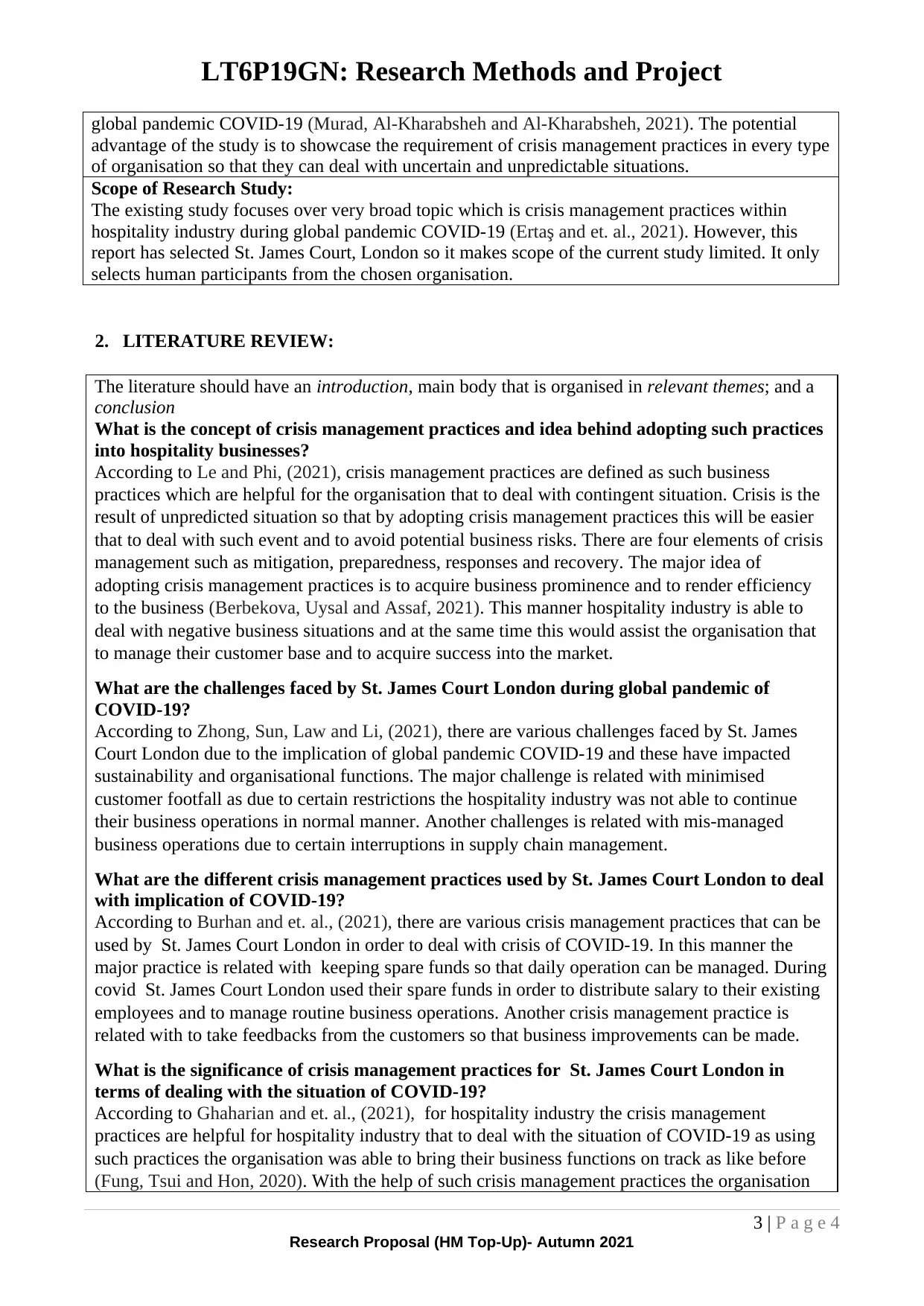
LT6P19GN: Research Methods and Project
global pandemic COVID-19 (Murad, Al-Kharabsheh and Al-Kharabsheh, 2021). The potential
advantage of the study is to showcase the requirement of crisis management practices in every type
of organisation so that they can deal with uncertain and unpredictable situations.
Scope of Research Study:
The existing study focuses over very broad topic which is crisis management practices within
hospitality industry during global pandemic COVID-19 (Ertaş and et. al., 2021). However, this
report has selected St. James Court, London so it makes scope of the current study limited. It only
selects human participants from the chosen organisation.
2. LITERATURE REVIEW:
The literature should have an introduction, main body that is organised in relevant themes; and a
conclusion
What is the concept of crisis management practices and idea behind adopting such practices
into hospitality businesses?
According to Le and Phi, (2021), crisis management practices are defined as such business
practices which are helpful for the organisation that to deal with contingent situation. Crisis is the
result of unpredicted situation so that by adopting crisis management practices this will be easier
that to deal with such event and to avoid potential business risks. There are four elements of crisis
management such as mitigation, preparedness, responses and recovery. The major idea of
adopting crisis management practices is to acquire business prominence and to render efficiency
to the business (Berbekova, Uysal and Assaf, 2021). This manner hospitality industry is able to
deal with negative business situations and at the same time this would assist the organisation that
to manage their customer base and to acquire success into the market.
What are the challenges faced by St. James Court London during global pandemic of
COVID-19?
According to Zhong, Sun, Law and Li, (2021), there are various challenges faced by St. James
Court London due to the implication of global pandemic COVID-19 and these have impacted
sustainability and organisational functions. The major challenge is related with minimised
customer footfall as due to certain restrictions the hospitality industry was not able to continue
their business operations in normal manner. Another challenges is related with mis-managed
business operations due to certain interruptions in supply chain management.
What are the different crisis management practices used by St. James Court London to deal
with implication of COVID-19?
According to Burhan and et. al., (2021), there are various crisis management practices that can be
used by St. James Court London in order to deal with crisis of COVID-19. In this manner the
major practice is related with keeping spare funds so that daily operation can be managed. During
covid St. James Court London used their spare funds in order to distribute salary to their existing
employees and to manage routine business operations. Another crisis management practice is
related with to take feedbacks from the customers so that business improvements can be made.
What is the significance of crisis management practices for St. James Court London in
terms of dealing with the situation of COVID-19?
According to Ghaharian and et. al., (2021), for hospitality industry the crisis management
practices are helpful for hospitality industry that to deal with the situation of COVID-19 as using
such practices the organisation was able to bring their business functions on track as like before
(Fung, Tsui and Hon, 2020). With the help of such crisis management practices the organisation
3 | P a g e 4
Research Proposal (HM Top-Up)- Autumn 2021
global pandemic COVID-19 (Murad, Al-Kharabsheh and Al-Kharabsheh, 2021). The potential
advantage of the study is to showcase the requirement of crisis management practices in every type
of organisation so that they can deal with uncertain and unpredictable situations.
Scope of Research Study:
The existing study focuses over very broad topic which is crisis management practices within
hospitality industry during global pandemic COVID-19 (Ertaş and et. al., 2021). However, this
report has selected St. James Court, London so it makes scope of the current study limited. It only
selects human participants from the chosen organisation.
2. LITERATURE REVIEW:
The literature should have an introduction, main body that is organised in relevant themes; and a
conclusion
What is the concept of crisis management practices and idea behind adopting such practices
into hospitality businesses?
According to Le and Phi, (2021), crisis management practices are defined as such business
practices which are helpful for the organisation that to deal with contingent situation. Crisis is the
result of unpredicted situation so that by adopting crisis management practices this will be easier
that to deal with such event and to avoid potential business risks. There are four elements of crisis
management such as mitigation, preparedness, responses and recovery. The major idea of
adopting crisis management practices is to acquire business prominence and to render efficiency
to the business (Berbekova, Uysal and Assaf, 2021). This manner hospitality industry is able to
deal with negative business situations and at the same time this would assist the organisation that
to manage their customer base and to acquire success into the market.
What are the challenges faced by St. James Court London during global pandemic of
COVID-19?
According to Zhong, Sun, Law and Li, (2021), there are various challenges faced by St. James
Court London due to the implication of global pandemic COVID-19 and these have impacted
sustainability and organisational functions. The major challenge is related with minimised
customer footfall as due to certain restrictions the hospitality industry was not able to continue
their business operations in normal manner. Another challenges is related with mis-managed
business operations due to certain interruptions in supply chain management.
What are the different crisis management practices used by St. James Court London to deal
with implication of COVID-19?
According to Burhan and et. al., (2021), there are various crisis management practices that can be
used by St. James Court London in order to deal with crisis of COVID-19. In this manner the
major practice is related with keeping spare funds so that daily operation can be managed. During
covid St. James Court London used their spare funds in order to distribute salary to their existing
employees and to manage routine business operations. Another crisis management practice is
related with to take feedbacks from the customers so that business improvements can be made.
What is the significance of crisis management practices for St. James Court London in
terms of dealing with the situation of COVID-19?
According to Ghaharian and et. al., (2021), for hospitality industry the crisis management
practices are helpful for hospitality industry that to deal with the situation of COVID-19 as using
such practices the organisation was able to bring their business functions on track as like before
(Fung, Tsui and Hon, 2020). With the help of such crisis management practices the organisation
3 | P a g e 4
Research Proposal (HM Top-Up)- Autumn 2021
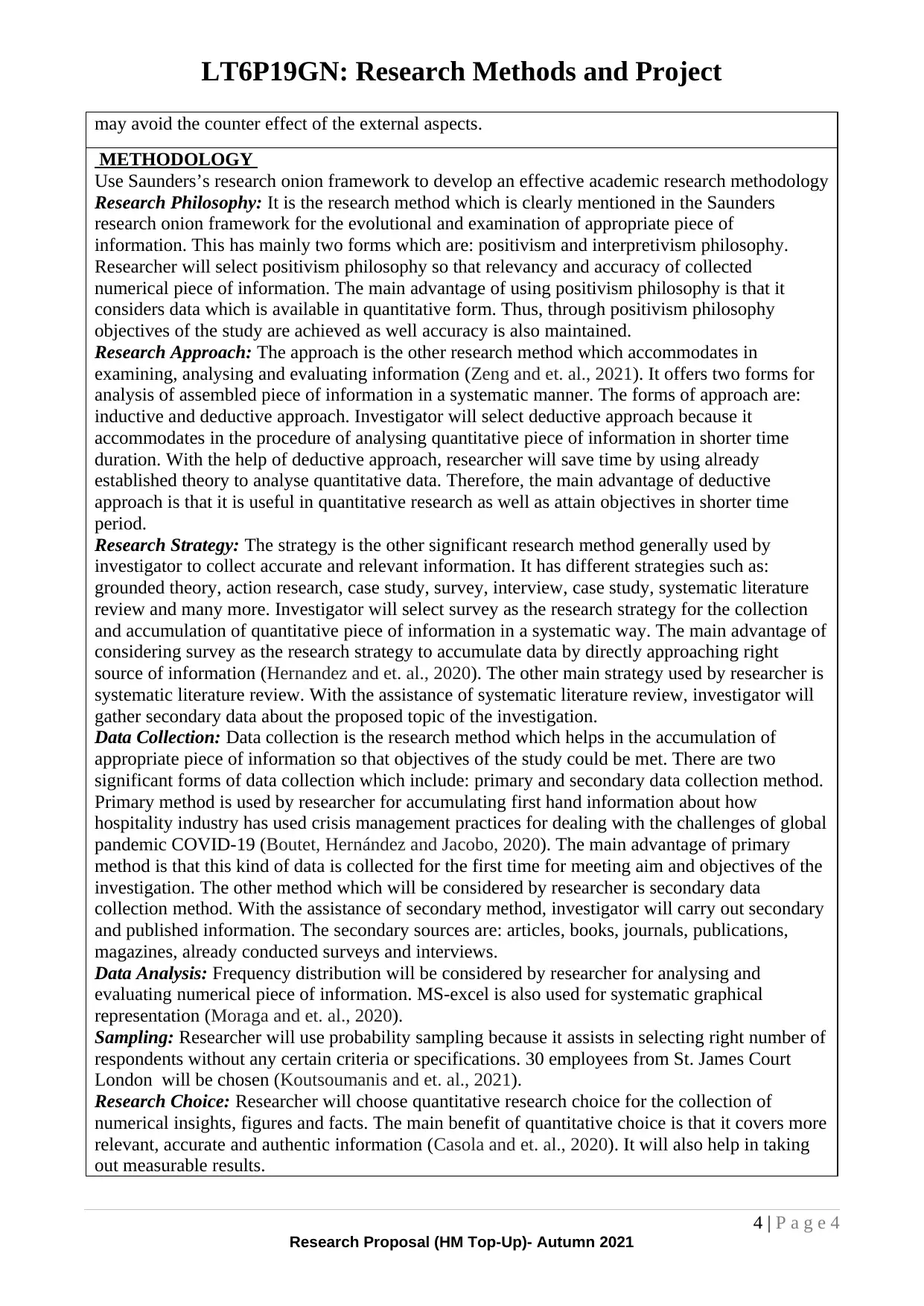
LT6P19GN: Research Methods and Project
may avoid the counter effect of the external aspects.
METHODOLOGY
Use Saunders’s research onion framework to develop an effective academic research methodology
Research Philosophy: It is the research method which is clearly mentioned in the Saunders
research onion framework for the evolutional and examination of appropriate piece of
information. This has mainly two forms which are: positivism and interpretivism philosophy.
Researcher will select positivism philosophy so that relevancy and accuracy of collected
numerical piece of information. The main advantage of using positivism philosophy is that it
considers data which is available in quantitative form. Thus, through positivism philosophy
objectives of the study are achieved as well accuracy is also maintained.
Research Approach: The approach is the other research method which accommodates in
examining, analysing and evaluating information (Zeng and et. al., 2021). It offers two forms for
analysis of assembled piece of information in a systematic manner. The forms of approach are:
inductive and deductive approach. Investigator will select deductive approach because it
accommodates in the procedure of analysing quantitative piece of information in shorter time
duration. With the help of deductive approach, researcher will save time by using already
established theory to analyse quantitative data. Therefore, the main advantage of deductive
approach is that it is useful in quantitative research as well as attain objectives in shorter time
period.
Research Strategy: The strategy is the other significant research method generally used by
investigator to collect accurate and relevant information. It has different strategies such as:
grounded theory, action research, case study, survey, interview, case study, systematic literature
review and many more. Investigator will select survey as the research strategy for the collection
and accumulation of quantitative piece of information in a systematic way. The main advantage of
considering survey as the research strategy to accumulate data by directly approaching right
source of information (Hernandez and et. al., 2020). The other main strategy used by researcher is
systematic literature review. With the assistance of systematic literature review, investigator will
gather secondary data about the proposed topic of the investigation.
Data Collection: Data collection is the research method which helps in the accumulation of
appropriate piece of information so that objectives of the study could be met. There are two
significant forms of data collection which include: primary and secondary data collection method.
Primary method is used by researcher for accumulating first hand information about how
hospitality industry has used crisis management practices for dealing with the challenges of global
pandemic COVID-19 (Boutet, Hernández and Jacobo, 2020). The main advantage of primary
method is that this kind of data is collected for the first time for meeting aim and objectives of the
investigation. The other method which will be considered by researcher is secondary data
collection method. With the assistance of secondary method, investigator will carry out secondary
and published information. The secondary sources are: articles, books, journals, publications,
magazines, already conducted surveys and interviews.
Data Analysis: Frequency distribution will be considered by researcher for analysing and
evaluating numerical piece of information. MS-excel is also used for systematic graphical
representation (Moraga and et. al., 2020).
Sampling: Researcher will use probability sampling because it assists in selecting right number of
respondents without any certain criteria or specifications. 30 employees from St. James Court
London will be chosen (Koutsoumanis and et. al., 2021).
Research Choice: Researcher will choose quantitative research choice for the collection of
numerical insights, figures and facts. The main benefit of quantitative choice is that it covers more
relevant, accurate and authentic information (Casola and et. al., 2020). It will also help in taking
out measurable results.
4 | P a g e 4
Research Proposal (HM Top-Up)- Autumn 2021
may avoid the counter effect of the external aspects.
METHODOLOGY
Use Saunders’s research onion framework to develop an effective academic research methodology
Research Philosophy: It is the research method which is clearly mentioned in the Saunders
research onion framework for the evolutional and examination of appropriate piece of
information. This has mainly two forms which are: positivism and interpretivism philosophy.
Researcher will select positivism philosophy so that relevancy and accuracy of collected
numerical piece of information. The main advantage of using positivism philosophy is that it
considers data which is available in quantitative form. Thus, through positivism philosophy
objectives of the study are achieved as well accuracy is also maintained.
Research Approach: The approach is the other research method which accommodates in
examining, analysing and evaluating information (Zeng and et. al., 2021). It offers two forms for
analysis of assembled piece of information in a systematic manner. The forms of approach are:
inductive and deductive approach. Investigator will select deductive approach because it
accommodates in the procedure of analysing quantitative piece of information in shorter time
duration. With the help of deductive approach, researcher will save time by using already
established theory to analyse quantitative data. Therefore, the main advantage of deductive
approach is that it is useful in quantitative research as well as attain objectives in shorter time
period.
Research Strategy: The strategy is the other significant research method generally used by
investigator to collect accurate and relevant information. It has different strategies such as:
grounded theory, action research, case study, survey, interview, case study, systematic literature
review and many more. Investigator will select survey as the research strategy for the collection
and accumulation of quantitative piece of information in a systematic way. The main advantage of
considering survey as the research strategy to accumulate data by directly approaching right
source of information (Hernandez and et. al., 2020). The other main strategy used by researcher is
systematic literature review. With the assistance of systematic literature review, investigator will
gather secondary data about the proposed topic of the investigation.
Data Collection: Data collection is the research method which helps in the accumulation of
appropriate piece of information so that objectives of the study could be met. There are two
significant forms of data collection which include: primary and secondary data collection method.
Primary method is used by researcher for accumulating first hand information about how
hospitality industry has used crisis management practices for dealing with the challenges of global
pandemic COVID-19 (Boutet, Hernández and Jacobo, 2020). The main advantage of primary
method is that this kind of data is collected for the first time for meeting aim and objectives of the
investigation. The other method which will be considered by researcher is secondary data
collection method. With the assistance of secondary method, investigator will carry out secondary
and published information. The secondary sources are: articles, books, journals, publications,
magazines, already conducted surveys and interviews.
Data Analysis: Frequency distribution will be considered by researcher for analysing and
evaluating numerical piece of information. MS-excel is also used for systematic graphical
representation (Moraga and et. al., 2020).
Sampling: Researcher will use probability sampling because it assists in selecting right number of
respondents without any certain criteria or specifications. 30 employees from St. James Court
London will be chosen (Koutsoumanis and et. al., 2021).
Research Choice: Researcher will choose quantitative research choice for the collection of
numerical insights, figures and facts. The main benefit of quantitative choice is that it covers more
relevant, accurate and authentic information (Casola and et. al., 2020). It will also help in taking
out measurable results.
4 | P a g e 4
Research Proposal (HM Top-Up)- Autumn 2021
Secure Best Marks with AI Grader
Need help grading? Try our AI Grader for instant feedback on your assignments.
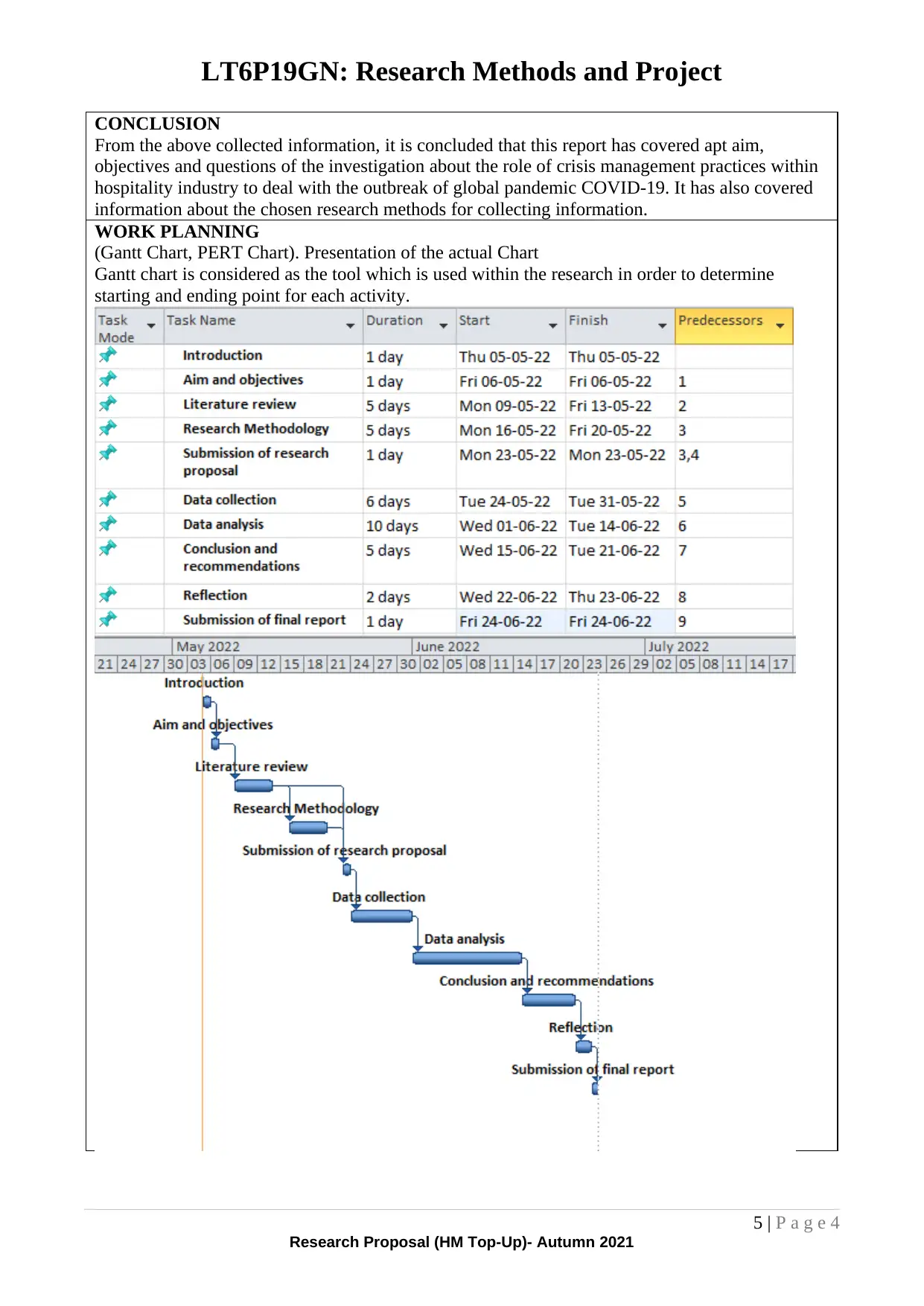
LT6P19GN: Research Methods and Project
CONCLUSION
From the above collected information, it is concluded that this report has covered apt aim,
objectives and questions of the investigation about the role of crisis management practices within
hospitality industry to deal with the outbreak of global pandemic COVID-19. It has also covered
information about the chosen research methods for collecting information.
WORK PLANNING
(Gantt Chart, PERT Chart). Presentation of the actual Chart
Gantt chart is considered as the tool which is used within the research in order to determine
starting and ending point for each activity.
5 | P a g e 4
Research Proposal (HM Top-Up)- Autumn 2021
CONCLUSION
From the above collected information, it is concluded that this report has covered apt aim,
objectives and questions of the investigation about the role of crisis management practices within
hospitality industry to deal with the outbreak of global pandemic COVID-19. It has also covered
information about the chosen research methods for collecting information.
WORK PLANNING
(Gantt Chart, PERT Chart). Presentation of the actual Chart
Gantt chart is considered as the tool which is used within the research in order to determine
starting and ending point for each activity.
5 | P a g e 4
Research Proposal (HM Top-Up)- Autumn 2021
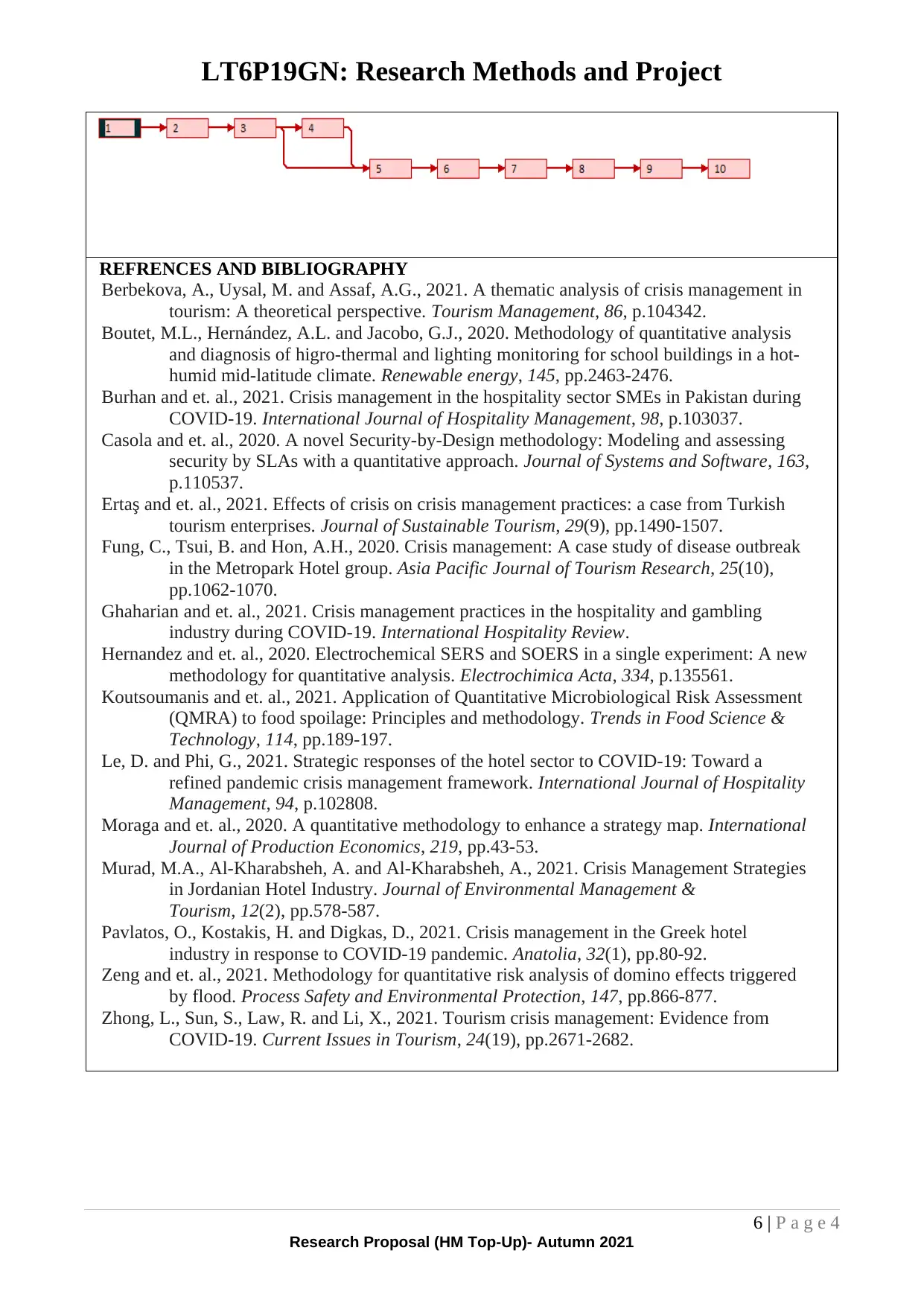
LT6P19GN: Research Methods and Project
REFRENCES AND BIBLIOGRAPHY
Berbekova, A., Uysal, M. and Assaf, A.G., 2021. A thematic analysis of crisis management in
tourism: A theoretical perspective. Tourism Management, 86, p.104342.
Boutet, M.L., Hernández, A.L. and Jacobo, G.J., 2020. Methodology of quantitative analysis
and diagnosis of higro-thermal and lighting monitoring for school buildings in a hot-
humid mid-latitude climate. Renewable energy, 145, pp.2463-2476.
Burhan and et. al., 2021. Crisis management in the hospitality sector SMEs in Pakistan during
COVID-19. International Journal of Hospitality Management, 98, p.103037.
Casola and et. al., 2020. A novel Security-by-Design methodology: Modeling and assessing
security by SLAs with a quantitative approach. Journal of Systems and Software, 163,
p.110537.
Ertaş and et. al., 2021. Effects of crisis on crisis management practices: a case from Turkish
tourism enterprises. Journal of Sustainable Tourism, 29(9), pp.1490-1507.
Fung, C., Tsui, B. and Hon, A.H., 2020. Crisis management: A case study of disease outbreak
in the Metropark Hotel group. Asia Pacific Journal of Tourism Research, 25(10),
pp.1062-1070.
Ghaharian and et. al., 2021. Crisis management practices in the hospitality and gambling
industry during COVID-19. International Hospitality Review.
Hernandez and et. al., 2020. Electrochemical SERS and SOERS in a single experiment: A new
methodology for quantitative analysis. Electrochimica Acta, 334, p.135561.
Koutsoumanis and et. al., 2021. Application of Quantitative Microbiological Risk Assessment
(QMRA) to food spoilage: Principles and methodology. Trends in Food Science &
Technology, 114, pp.189-197.
Le, D. and Phi, G., 2021. Strategic responses of the hotel sector to COVID-19: Toward a
refined pandemic crisis management framework. International Journal of Hospitality
Management, 94, p.102808.
Moraga and et. al., 2020. A quantitative methodology to enhance a strategy map. International
Journal of Production Economics, 219, pp.43-53.
Murad, M.A., Al-Kharabsheh, A. and Al-Kharabsheh, A., 2021. Crisis Management Strategies
in Jordanian Hotel Industry. Journal of Environmental Management &
Tourism, 12(2), pp.578-587.
Pavlatos, O., Kostakis, H. and Digkas, D., 2021. Crisis management in the Greek hotel
industry in response to COVID-19 pandemic. Anatolia, 32(1), pp.80-92.
Zeng and et. al., 2021. Methodology for quantitative risk analysis of domino effects triggered
by flood. Process Safety and Environmental Protection, 147, pp.866-877.
Zhong, L., Sun, S., Law, R. and Li, X., 2021. Tourism crisis management: Evidence from
COVID-19. Current Issues in Tourism, 24(19), pp.2671-2682.
6 | P a g e 4
Research Proposal (HM Top-Up)- Autumn 2021
REFRENCES AND BIBLIOGRAPHY
Berbekova, A., Uysal, M. and Assaf, A.G., 2021. A thematic analysis of crisis management in
tourism: A theoretical perspective. Tourism Management, 86, p.104342.
Boutet, M.L., Hernández, A.L. and Jacobo, G.J., 2020. Methodology of quantitative analysis
and diagnosis of higro-thermal and lighting monitoring for school buildings in a hot-
humid mid-latitude climate. Renewable energy, 145, pp.2463-2476.
Burhan and et. al., 2021. Crisis management in the hospitality sector SMEs in Pakistan during
COVID-19. International Journal of Hospitality Management, 98, p.103037.
Casola and et. al., 2020. A novel Security-by-Design methodology: Modeling and assessing
security by SLAs with a quantitative approach. Journal of Systems and Software, 163,
p.110537.
Ertaş and et. al., 2021. Effects of crisis on crisis management practices: a case from Turkish
tourism enterprises. Journal of Sustainable Tourism, 29(9), pp.1490-1507.
Fung, C., Tsui, B. and Hon, A.H., 2020. Crisis management: A case study of disease outbreak
in the Metropark Hotel group. Asia Pacific Journal of Tourism Research, 25(10),
pp.1062-1070.
Ghaharian and et. al., 2021. Crisis management practices in the hospitality and gambling
industry during COVID-19. International Hospitality Review.
Hernandez and et. al., 2020. Electrochemical SERS and SOERS in a single experiment: A new
methodology for quantitative analysis. Electrochimica Acta, 334, p.135561.
Koutsoumanis and et. al., 2021. Application of Quantitative Microbiological Risk Assessment
(QMRA) to food spoilage: Principles and methodology. Trends in Food Science &
Technology, 114, pp.189-197.
Le, D. and Phi, G., 2021. Strategic responses of the hotel sector to COVID-19: Toward a
refined pandemic crisis management framework. International Journal of Hospitality
Management, 94, p.102808.
Moraga and et. al., 2020. A quantitative methodology to enhance a strategy map. International
Journal of Production Economics, 219, pp.43-53.
Murad, M.A., Al-Kharabsheh, A. and Al-Kharabsheh, A., 2021. Crisis Management Strategies
in Jordanian Hotel Industry. Journal of Environmental Management &
Tourism, 12(2), pp.578-587.
Pavlatos, O., Kostakis, H. and Digkas, D., 2021. Crisis management in the Greek hotel
industry in response to COVID-19 pandemic. Anatolia, 32(1), pp.80-92.
Zeng and et. al., 2021. Methodology for quantitative risk analysis of domino effects triggered
by flood. Process Safety and Environmental Protection, 147, pp.866-877.
Zhong, L., Sun, S., Law, R. and Li, X., 2021. Tourism crisis management: Evidence from
COVID-19. Current Issues in Tourism, 24(19), pp.2671-2682.
6 | P a g e 4
Research Proposal (HM Top-Up)- Autumn 2021
1 out of 6
Related Documents
Your All-in-One AI-Powered Toolkit for Academic Success.
+13062052269
info@desklib.com
Available 24*7 on WhatsApp / Email
![[object Object]](/_next/static/media/star-bottom.7253800d.svg)
Unlock your academic potential
© 2024 | Zucol Services PVT LTD | All rights reserved.





